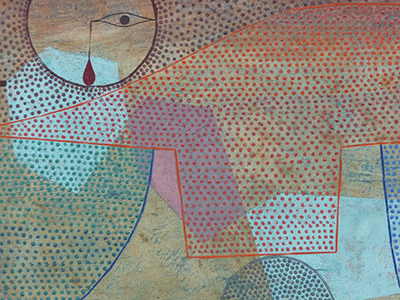Sunset - Through Klee's Eyes
Originally painted as an oil on canvas in 1930, "Sunset" appears at first glance, as a striking yet simple geometric landscape. On closer inspection the image is far more complex and has great depth.
Overlapping geometric shapes and abstracts combine with an almost rhythmic placing of dots or pointillism to create the musical element that Klee, a trained musician, felt could be incorporated into art.
Klee describes this as polyphonic painting where the different shapes and textures could represent different sounds. His painting titled "Polyphony", created in 1932, is another example of the use of pointillism to express this musical expression in his artwork.
Klee was also influenced by children's and primitive folk art and this childlike playfulness is also apparent in the image. Klee visited Egypt in 1928-9 which may explain the slightly Egyptian appearance of the eye, in what appears as a schematic face in the upper corner of the painting. Other paintings also show Klee's use of pictorial signs and symbols such as arrows and hieroglyphs.
Klee was also an expert in line and colour. He used colour expressively. The colours in this painting are reminiscent of some of Klee's earlier works in watercolour, such as Fishes in the Harbour (1916).
With influences from cubism, surrealism, expressionism and orientalism, Klee's paintings are often difficult to classify. Klee's work became highly sought after during this period and prior to Adolph Hitler denouncing his work as subversive in 1933.
Despite this, Klee's unique, imaginative style and incredible use of colour has continued to influence many other artists.
This simple yet striking piece of art by Paul Klee is a visual feast for the eyes and will orchestrate many conversations.




